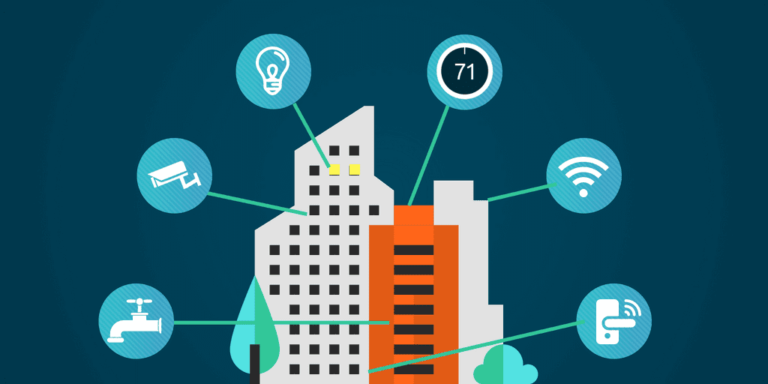
In today’s increasingly complex commercial buildings, building management systems play a necessary role in keeping everything functioning smoothly. Behind the scenes in modern commercial facilities are a multitude of electrical, mechanical, and security systems. These systems control everything in the structure, from the temperature in the rooms to the lighting in the parking lot. While these systems all function fine on their own, a building management system networks and integrates these diverse systems so they can share information and work together more synergistically. This allows the building to operate more efficiently, resulting in lower energy costs, enhanced security, and a more comfortable and responsive building environment.
Building management systems are also known as building automation solutions, because they can be set to operate your building controls according to information received through occupancy sensors, RFID scanners, and other smart components. One of the major benefits of this automation is a vast decrease in the amount energy wasted in buildings – these controls can reduce unnecessary energy use by as much as 30%.
Instead of wasting energy in unoccupied areas of the facility, a building management system uses motion detectors, RFID scanners, elevator, and access control to monitor the location of occupants. Once an area is deserted, the building management system automatically adjusts the functioning of key building control systems to conserve energy. Building management systems also make buildings more comfortable and safe for occupants. Here are just a few of the ways building management systems improve the functioning of control systems in facilities:
Temperature Solutions
Building management systems use temperature control technology to adjust the HVAC, cooling, and ventilation systems in several ways to eliminate energy waste. Occupancy controls can automatically adjust the system during the day when an area becomes deserted. Scheduling features can control the temperature according to time of day and week, and maintain a set temperature point when occupied.
Lighting Controls
Using information from occupancy sensors, lighting controls can be set to turn off lights when an area of the building is empty. Time and zone controls can be set to switch illumination on and off on a set schedule. Lights in outdoor areas such as parking lots, loading docks, and property entrances can be set to turn on and off according to sunset and sunrise schedules. Ambient light sensors can be employed to turn lights on and off according to how dark or light it is outside.
Air Quality Control
Building automation systems protect tenants from potential harm caused by poor air quality through indoor air monitoring in buildings and parking garages. These systems can control humidity, purify air, remove unwanted odors, and most importantly, they can identify and eliminate unsafe levels of carbon monoxide, carbon dioxide, and nitrogen dioxide to ensure occupant comfort and health.
Security Solutions
Occupants can enjoy enhanced safety and peace of mind when building management systems are used to create integrated security systems. These systems incorporate elevator security control, access control, digital CCTV recording solutions, and CCTV cameras to blanket the building in protection.
The latest smart building management systems incorporate web and cloud-based technology that allows owners to monitor and access the controls of their facility from anywhere in the world. Owners can use browser-based software on their smartphone, tablet, or PDA to access their building controls remotely in real-time.
Major advancements in storage, aggregation and analysis of data in the built environment have ushered in a new frontier in building design and operation, prompting unprecedented levels of efficiency and a human-centric experience that is intuitive, seamless and personalized for all.
Smart buildings provide actionable insights into how a building is operating. In a smart building, real-time data is reported and used to inform decisions on building operations. Portfolio managers can see their operations across the globe and compare performance, giving them actionable insight on how to drive efficiencies and improvements.
Learn How Smart Building Management Systems Work
Contact Advanced Control at 954-491-6660 to discover just how efficiently your building can operate with the installation of one of our smart building management systems!

